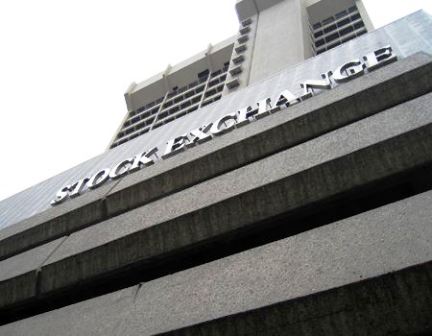BUSINESS
FBN Securities, 9 other stockbrokers trade N1.21trn in 11 months

Sumbo Babajide
Ten stockbroking firms traded N1.21 trillion worth of equities transactions on the Nigerian Stock Exchange (NSE) in 11 months trading activities.
This amount was recorded in 11 months of this year, putting the 10 stockbroking firms at 67.38 per cent of total value of transactions traded at the nation’s stock market.
The 10 firms are Stanbic IBTC Stock brokers Limited, CSL Stockbrokers Limited, Rencap Securities (Nigeria) Limited, EFCP Limited, Chapel Hell Denham Securities Limited and FBN Securities Limited.
Others are Vetiva Securities, African Alliance Stockbrokers Ltd and A.R.M Securities Limited and APEL Asset Limited.
Exclusive details of the transaction that was made available to our correspondent revealed that in the 11 months of November, 2015, Stanbic IBTC Stock brokers Limited accounted for N248.28 billion worth of transactions or 13.87 per cent of the N1.21 trillion traded by the 10 firms.
CSL Stockbrokers Limited accounted for N231.35 billion or 12.92 per cent, Rencap Securities (Nigeria) Limited N193.9 billion or 10.83 per cent, EFCP Limited N150 billion or 8.38 per cent and Chapel Hell Denham Securities Limited N90.8 billion, worth of deals or 5.07 per cent value of transactions.
On the other hand, FBN Securities Limited accounted for N89 billion or 4.97per cent; Vetiva Securities recorded N56.19 billion or 3.14 per cent, while African Alliance Stockbrokers Ltd traded N 51.3 billion worth deals or 2.87 per cent.
A.R.M Securities Limited also made the top players league by controlling about N49.4 billion worth of transactions or 2.76 per cent, while APEL Asset Limited traded N 45.6 billion worth of shares or 2.55 per cent of the N1.21 trillion worth of deals by the big players.
Further checks reveals that firms’ transactions were from inflow of Foreign Portfolio Investors (FPIs), local institutional investors and equity exposure in mutual funds. Their major clients are foreign portfolio investors, while a few of them have significant equity exposure through their collective Investment Schemes (CIS) or mutual funds through which they access trading volumes weekly.
Before now, analysts have noted that these companies have some of the most diversified portfolios of clients which others envy. There are about 241 active stockbroking firms operating in the NSE.
The activities of these big stockbroking firms have made the market tilt towards oligopoly- a market dominated by few buyers and sellers who create room for a sort of imperfect competition, in order to accrue greater revenue and market share.
Analysts disclosed that in addition to being the biggest trading houses for FPIs, they also play big among the local institutional and high net-worth investors.
Meanwhile, Securities and Exchange (SEC) recently mandated Capital Market Operators (CMOs) to comply with new minimum capital requirement at which over 97 per cent complied.
The final list of CMOs that met the deadline represents 437 out of the total 449 registered capital market operators published after the necessary capital verification that was conducted on September 30,2015 deadline.
The apex capital market operators on its website listed four operators processing merger applications approvals and court sanctioning. Findings by our correspondent revealed that 30 Brokers and 174 Broker/Dealers have complied.
The apex regulator of the nation’s capital market increased minimum capital base for broker/dealer by 329 per cent from the existing N70 million to N300 million. A broking firm which operated with capital base of N40 million, now has N200 million, representing an increase of 400 per cent.
While the minimum capital for dealer was raised by 233 per cent from N30 to N100 million, that of issuing houses (facilitators of new issues in the primary market) was increased to N200 million from N150 million.
The capital requirement for a company to underwrite issues was also raised from N100 to N200 million, just as share registration companies now have to raise their capital base from N50 to N150 million.
The minimum capital for corporate investment advisers was however retained at N5 million, unlike individual investment advisers who would only operate with a 300 per cent hike in capital base from N500,000 to N2 million.
To facilitate the smooth implementation of the new minimum capital requirements for operators, the CMC set up a market-wide “Implementation Committee on New Minimum Capital Requirement for CMOs,” comprising the SEC, Nigerian Stock Exchange (NSE), Central Securities Clearing System (CSCS), ASHON and all other capital market trade groups.




 Davido's Net Worth & Lifestyle
Davido's Net Worth & Lifestyle 
